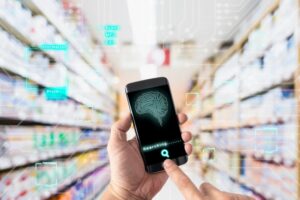By leveraging machine learning in retail, brands will possess the ability to enhance every part of the sales process, from supply chain management to consumer marketing and purchasing. This technology can be used to communicate more effectively with customers and improve product logistics. Hardware improvements make machine learning more accessible for brands than it’s ever been, meaning that it’s much more cost-effective to implement in every single part of the sales funnel.
When it comes to marketing, machine learning is rife with potential. Brands could use it to understand the purchase intent of customers, provide personalized service, and improve sales using an automated system. It’s also a critical component of artificial intelligence, meaning that any brand that wishes to leverage AI must first understand machine learning and its impact on the retail landscape.
Understanding Machine Learning and How It Differs From AI
In the past, one of the significant limitations of computer processes was the programming requirement. Machines weren’t capable of taking any actions without someone programming those actions into the system. Machine learning removes the need to continuously program. Using algorithms, machine learning allows the device to logically understand the next step. This process is continuous, so the more the computer does, the more capable it becomes of working independently.
Machine learning and artificial intelligence (AI) are often referred to interchangeably, but there are some subtle differences between the two. AI is a catch-all term that describes teaching technology to think like humans. Machine learning is a branch of AI that focuses these efforts on enhancing computer processes. It’s about teaching computers to learn independent of programming.
 The machine accomplishes this through data and labeling. Using large data sets, it’s able to recognize similarities between these sets and group them. It can then take actions based on these groups. When applied to a retail environment, it can be used to improve the shipping process to enhance customer service and increase sales.
The machine accomplishes this through data and labeling. Using large data sets, it’s able to recognize similarities between these sets and group them. It can then take actions based on these groups. When applied to a retail environment, it can be used to improve the shipping process to enhance customer service and increase sales.
Applications for Machine Learning in Retail
There are many reasons to take advantage of machine learning in retail. Whether retailers want to improve their supply chain or connect with consumers in a more personal way, there’s a way to use AI and machine learning. Here are a few facets that could benefit from the application of machine learning in retail.
- Supply chain: In the supply chain, machine learning can be used to meet high demand in specific areas by analyzing past shipment data and sending orders automatically. It can also improve the ability to quality check loads by using factors like freight weight, historical data, origin, and other details to predict the likelihood of product damage within a given shipment.
- Advertising: Programmatic advertising is a type of machine learning that allows an ad platform to use consumer behavior to provide targeted ads to the individuals most likely to click on them. As machine learning advances, this type of advertising will also become more sophisticated and intelligent. It will make its way into other devices like smart appliances, televisions, wearables, and speakers.
- Customer needs: The applications for machine learning in customer service are virtually endless. These programs can enhance online customer service by understanding the needs of consumers communicating with a chatbot and offering viable solutions. They can be used to track down concerns on social media and other public forums and increase response times, which will improve overall brand affinity. It can even be used to provide follow-up offers to consumers who have purchased products in the past, inspiring brand loyalty.
- Rewards programs: Digital rewards programs can enjoy some machine learning enhancements by providing ways for consumers to receive rewards based on their shopping habits, personal preferences, and location. Location-based advertising is one of the primary reasons that brands work with Shopkick. They can leverage the shopping rewards app to send messages to consumers as they’re in the aisle and provide them with rewards for scanning products. This increases top-of-mind awareness and overall sales. Also, brands that work with Shopkick get to take advantage of innovations in the app as they’re rolled out, allowing them to stay on top of advancements in technology.
Machine learning in retail is enhancing the ability of brands to connect with consumers when it matters most.
Machine learning in retail is enhancing the ability of brands to connect with consumers when it matters most. Whether they’re delivering ads based on the consumer’s purchase history, or providing deals based on their locations, there’s a lot that can be done with data. Creating a personalized experience is a great way to draw the attention of consumers and obtain a more substantial part of the market compared to competitors who aren’t as forward-thinking.
Shopkick works with our partners who want to take advantage of machine learning in retail by offering them access to the user base of our innovative mobile app. To see how this app has enhanced marketing for many brands, check out some of our success stories.
Image courtesy of My Stock


